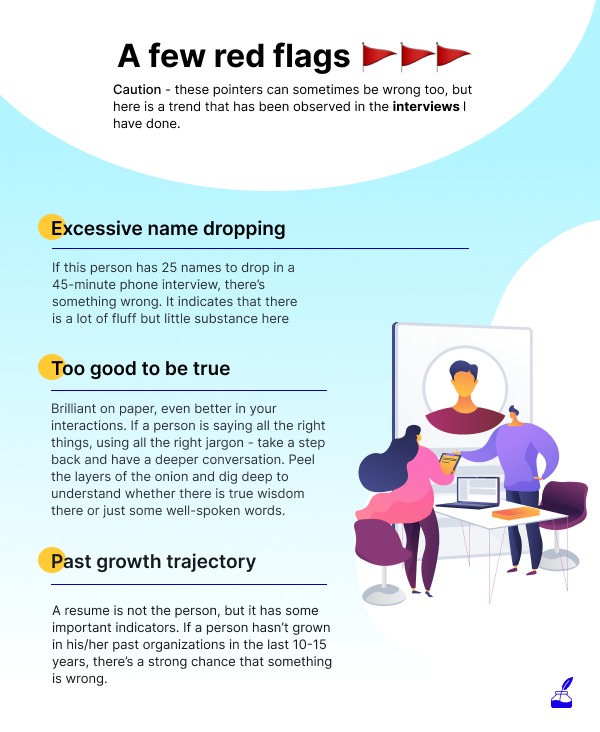Don’t sell me this pen: What I learned about hiring after 2000+ interviews

Sweaty palms, shallow breaths, and a stomach that was doing cartwheels: this was my first interview. Correction: the first interview I would be conducting.
In 2020, while my batch-mates were busy giving interviews, hoping to make the cut and get a placement, I was building Pepper Content with my friends and college mates. This meant taking interviews for revenue and other non-technical roles so we could build a team to help us scale fast.
As a twenty-two-year-old still in college, I have to admit it wasn’t easy. I had no formal training in interviewing people and in most cases, I was interviewing people older and more experienced than me. I was nervous and unsure: what could I possibly evaluate them on?
Now, more than 2000 interviews later, I have devised my own checklist, an intuitive sense of knowing who is the perfect fit for Pepper and who isn’t. I could be wrong (and of course, I have been in the past), but these lessons have, by and large, served me well. I hope these can help the readers of this blog as well:
The Buy-In
As a young start-up with very little word of mouth, we knew the first step to getting someone interested to work with us was to have them ‘buy into the idea of Pepper’. So effectively, every interview started with a pitch, and every cold email or LinkedIn outreach was about what we did and how Pepper would change the world of content as we know it.
An important part of this ‘buy-in’ process was that we never called the ‘interview’ as such. We called it ‘an exploratory call’, a chance to simply hear each other out and to learn about their story.
This immediately changes the way an individual approaches us and I believe it is also very telling of the company’s culture: a transparent conversation of equals. We might be young but we are confident in what we are creating and at the same time we recognize your expertise and experience. One cannot function without the other and this is a part of Pepper’s DNA. It seemed smart to acknowledge this truth right at the get-go.
The Story
I’ve heard some phenomenal answers to this question. I have also seen people completely thrown off by this as it is not the usual ‘introduce yourself’ approach. From climbing Mt Everest to having a passion for skydiving, I have come to realize some of the most inspiring professionals, working in the largest enterprises in the world, also lead rich lives. Their story is so much more than their CV and that story is what invigorates them to perform well at work.
The Team
An important benchmark when it comes to high-level executive talent is to understand the team that they work with and how they hire. The talent they hire and the processes they use to do so can be very telling. So here’s what I usually ask (or indirectly gauge):
- Have you hired the team you work with?
- What do you look for when hiring?
- When (and if) you leave your current organization, how many people would leave with you?
- How many from your team moved with you when you left your previous organization? Or
- Where is your team now?
Some of these questions seem very direct, so you have to ask them more tactfully. If you’re listening carefully, this information can be very revealing. For instance, this will tell you, how easy he/she is to work, are they a team player, and how important is hiring the right talent, for them? I am a firm believer in company culture and that the people you choose to hire determine the culture in a big way. Most importantly, at Pepper we want to be intentional about the culture we build.

The Hustle
Not many people know this, but back when we were building Pepper and trying to get more and more people to try out the services, we got a hold of the list of sponsors for our college fest and started cold calling. Sure, it was an untraditional way to get a database, but we managed to get quite a few clients from the list.
Running a business is about making things happen … against all odds. It might be a controversial thing to say but sales is an ‘out-of-the-box’ role and there is no room for excuses.
It is essential that senior leaders have this ‘hustle culture’ as a part of who they are. It doesn’t need to be the answer to everything, but frugality should definitely be a part of the approach an individual takes. It is like the curative medicine for any roadblocks.
A senior executive working with a cab company didn’t have the funds to sponsor a popular fest with a massive footfall. He decides to cover the wall opposite the venue with a giant poster that says, ‘Book a ride with us’ and a QR code follows. Cost? Rs 4000. He then tells five of the autorickshaw drivers frequenting the venue to market his cab service to anyone wanting a ride and pays their daily fare instead. No sponsorship, no problem.
Such are the stories I have heard in these interviews. If this isn’t innovative thinking, what is? I usually ask in interviews:
- What was your quota? What do you think you could have done to achieve more?
If the answer is a slew of excuses, then Houston, we have a problem.
The Work of Your Lives
I believe that we get two to three opportunities to do ‘the work of our lives’. This could be anything from running your own business to helping someone scale their company to a million users and so forth. Once you’ve achieved this twice or thrice, it is tough to go down that road again to build something from scratch. Not saying exceptions do not exist!
When hiring for senior roles, this ‘hunger’ is supremely important to us. We’re in the phase of building a business and the kind of grit and temperament that is needed to ‘build’ is of a very different kind as compared to the mentality needed to sustain or ‘run’ a business. The question to ask here is simple:
- Are you willing to start again from scratch?
Second-order Thinking
At senior levels, it is important to think about the consequences of a decision beyond the immediate intended gains. This level of ‘deeper’ thinking, is something that is imperative to gauge in those early interactions. A simple way of doing this is to ask:
- What was the biggest challenge you faced in your previous organization and how did you overcome it?
Once they answer, go deeper, and deeper and deeper. Ask what, why, and how, every step of that answer. This is the most effective way to separate the chaff from the grain, the fakers from the real OGs.
The Ability to Unlearn
At executive level hiring, it is common to find brilliant professionals who have deep expertise in what they do but are only willing to do it in that same way. When you’re a new-age start-up, not aspiring to lead a category but to create one, the rules are different. If a candidate finds it difficult to adjust to this new rhythm, it is unlikely that synergies will match. Here’s how one can test this out:
- Tell them how Pepper is disrupting the status quo and then check for resistance to this change. How easy or difficult is it for them to adjust their strategies?
This ‘resistance to change’ is the best way to assess how right this person is for your organization.
Dark Reference Checks
I once went through six reference checks (provided by the candidate) for a senior professional – all gave rave reviews. And then decided to do my own due diligence and called four more contacts who had terrible things to say about him. Ever since then, I have become a believer in dark reference checks. Don’t fall for what people want you to see. Want to hire and retain the right people? Dig deeper and do your homework.
I may not have had any training in conducting high-level interviews or evaluating the best in the business. But I have learned on the job. In the last two years, I have interviewed Business Heads, CEOs, and Sales Leaders who have scaled small startups to multibillion-dollar companies. This journey has been my on-the-job course in sales and revenue and it is how I have upskilled myself as a business leader and interviewer. And met some fantastic mentors and sales heroes to boot! Oh, the stories I can tell … but there’s another post for that.
Kishan Panpalia heads Business for Pepper Content. If you think you have what it takes to be part of this high-performing team, check out the careers page.
Latest Blogs
Learn how to rank on AI search engines like ChatGPT, Perplexity, and Gemini by optimizing your content for authority, structure, and relevance. Stay ahead in AI-driven search with this strategic guide.
Explore the best healthcare SEO services for your medical practice. Improve online visibility and effectively reach more patients in need of your services.
Discover top social media agencies specializing in banking solutions, enhancing financial services and driving engagement.
Get your hands on the latest news!
Similar Posts

B2C Marketing
5 mins read
Top Choices for Best Content Marketing Services in B2B Industries

Artificial Intelligence
5 mins read
How Free AI Tools for Content Creation Can Boost Your Content Strategy

Artificial Intelligence
6 mins read